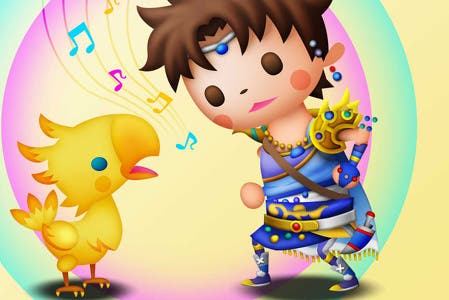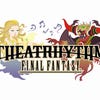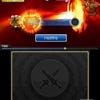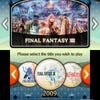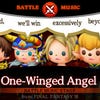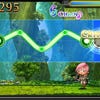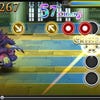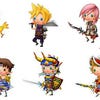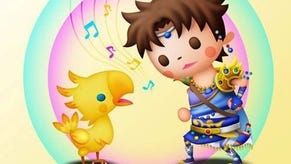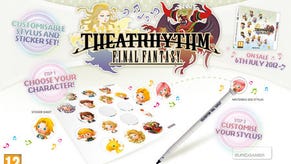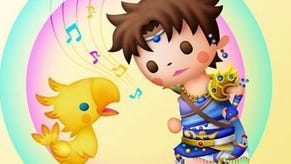Theatrhythm Final Fantasy Preview: The Best Final Fantasy on Nintendo in Years
Beat the beat.
Final Fantasy has had a troubled relationship with recent Nintendo platforms. The slightly lacklustre Crystal Chronicles subseries was always a sideshow to the franchises' main offerings, never available on Nintendo consoles. No wonder then that the barely-pronounceable reveal of Theatrhythm, a rhythm-based Final Fantasy spin-off, did nothing to reassure fans that Square Enix saw the 3DS as anything more than another proving ground for more derivative experiments.
But Theatrhythm, perhaps tellingly, makes no mention of the series' Crystal Chronicles days. The game's jukebox proudly blasts remixes from the main Final Fantasy canon, with every core numbered release represented. Starting at the 8-bit chiptunes of Final Fantasy 1 and finishing with the orchestral masterpieces of Final Fantasy 13, this is the first time you'll ever hear Final Fantasy 7's 'One Winged Angel' on a Nintendo system.
Theatrhythm keeps a familiar dosage of RPG elements despite its musical focus and ignorable story. You recruit a four-man party from the game's huge cast of fan favourite characters, each redrawn in the game's chibi style. Each begins the game as a grumpy level 1 novice. "Get lost," berates pink haired Final Fantasy 13 heroine Lightning. "I'm no hero!" whines Final Fantasy 7's Cloud. Luckily these weaklings can be levelled up, increasing their stats and unlocking gameplay-aiding abilities.
With your party chosen, it's off to battle. The game's tunes are split into three gameplay styles, the first being fast-paced battle anthems. Here, notes fly toward your party as you try to defeat a steady stream of foes before the piece ends. The notes themselves involve you tapping the touch-screen, holding notes down or swiping in a specific direction. The level of your characters' strength and magic attributes will aid your progress, with more XP (or "Rhythmia") awarded for besting stronger enemies and bosses.
There are also more relaxed field music tunes, where you must move your stylus in time to curved note lines on the screen above. Party member's agility and luck stats will earn you greater points here, something that also holds true in the third song type, event songs. Event tunes play out over cut-scenes from their respective original game, while you must keep track of your note cursor as it flies across the screen.
Miss notes, or hit one poorly enough to score a "bad" rating, and you lose health. Deplete your health bar entirely and it's game over. Extra XP is awarded upon completion for note streaks, with extra points for playing as one of the game's own cast. Each piece includes a Feature Zone, a special sequence which unlocks points-boosting bonuses for scoring every note, including summons for battle music, Chocobo racing for field tunes and an extra verse in event tracks.
The game can be played in Story mode, where a set of tracks from a particular Final Fantasy title is played in sequence, Challenge mode where you can attack individual unlocked tunes, or the Chaos Shrine, home to the Theatrhythm's toughest challenges and music unavailable to play elsewhere.
Theatrhythm offers three song difficulties, each unlocked upon completion of the last. The starting level offers a straightforward introduction to the game, with 'S' rank finishes easily obtainable. It's a good thing too, as the game's enticing chibi animations and distracting event level cut-scenes constantly wrestle for your eyes' attention behind the game's note lines.
Completing a song will frequently shower you with rewards and upgrades, luring you into the game's collectibles Museum, home to albums of collectible Final Fantasy trading cards and other tidbits of fan-service to unlock. Smash through one of the game's early tracks with near-perfect accuracy and each of your four characters will likely level up several times, making for a slightly irritating loop of level-up notifications. Still, you'll quickly gain access to handy abilities that include strength boosts should your health bar slip too low, or super-charged attacks every time you score a specific note streak.
It's debatable how much of an incentive there is to mix and match your four-man party with the dozen or so other variables, rather than simply sticking with your personal favourites. Those looking to nail the best possible scores will find specific characters tailored slightly better to certain track rosters, although picking a party and working on levelling that core group will mean faster access to better powers.
Whichever method you end up subscribing to, you'll need a strong party to attack the Chaos Shrine mode, home to a range of rock-hard two song medleys. The higher difficulty means rewards are plentiful though, with multiple bosses available for each medley (or "Dark Note") and prizes such as extra character-unlocking crystal shards.
Completing one Dark Note unlocks another, or you can get faster access to more by StreetPassing other players with the game. Theatrhythm's StreetPass mode allows you to create a profile, complete with a customisable business card and attachable Chaos Shrine tune. Collected profile cards ("ProfiCards") can be hoarded and pawed over, like the 3DS system's own Mii Plaza.
Theatrhythm will also take advantage of the 3DS' latest feature: downloadable content. It was one of the first 3DS games to add premium additional content in Japan, where the game has sold hundreds of thousands of copies. Square Enix will bring a range of downloadable content to Europe, too. There's no missing the option either: it's the only button on the game's main title screen, invitingly placed directly under "Touch to Start".
Theatrhythm: Final Fantasy is a curious blend of old and new, its classic tunes a testament to the series' well-loved heritage, all wrapped up in a shiny new package. It may not be a fully-fledged Final Fantasy game on a Nintendo system, but Theatrhythm does what it sets out to superbly. Its handheld-friendly gameplay is perfect for the 3DS, and it succeeds in honouring the main Final Fantasy series, rather than trying to reproduce it.
